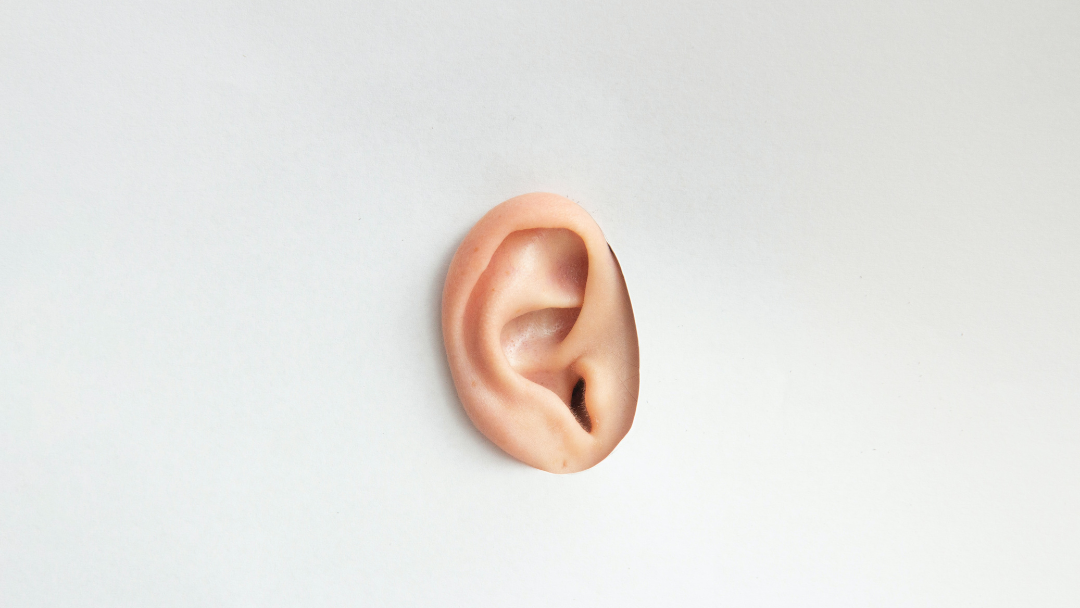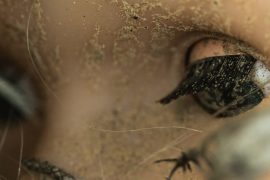Named a Finalist for the 2022 Summer Short Fiction Prize
THE COFFEE MAKER.
The microwave.
The notification that yet another person, someone you haven’t spoken to in over two years, likes the comment you made about your toast.
The toaster.
The alarm that’s meant to get you up at six so you can go to the gym, but that keeps on for thirty minutes, stopping and starting every five. Somehow you manage to always fall right back asleep for those few minutes, and that is when you dream the most. Yesterday it was about traveling along a gravel road with two very overweight women. You pulled over to admire some ditch lilies, and one of the ladies bent straight over, like that wooden cutout in your neighbor’s flower bed. In the dream, you thought: here it is, in real life.
The security gate at Hy-Vee every time you walk out. No matter what you buy, or what you’re wearing, you are always stopped by some very old man who has trouble walking over to you. You don’t make it any easier. You stay right where you are.
A voicemail notice, from your sister. She says, in part: Heey. So I know you really want me to come visit, and I do too! I really do. I really want to come out and see your place, it’s just really far and maybe you could come back here for a few weeks? It’d be so fun to see you!
A low battery warning from your phone. You set it down on the dining room table, and walk away.
The house alarm when you walk through the back door. You sit out on the deck and put your feet up on the table. Look at the yard you’ve filled with flower beds: zinnias, coneflower, delphinium, winding nasturtiums that are starting to climb all over. An outdoor space like this would cost how much in Chicago, you think. How much would your sister pay for this, and parking?
But there’s nothing to do here, you hear her say.
That’s the point, you say hypothetically back in return. You are five hours from her, in a rural location – a non-touristy rural location – so you may well have disappeared.
Someone locking their car with a key fob. You don’t know your neighbors. You know enough to recognize them, enough to know which cars are familiar driving down this dead-end street.
Your watch reminding you to move, so you do: Down the street towards town, past the bars and the coffee shops, and the dogs parked patiently outside, waiting for their owners. Past the Catalpa tree, Denny’s autobody, the Casey’s gas station with bikes in a pile outside, like the kids rode them right up to the door, right until the last possible moment, before leaping off and running inside.
Your watch reminding you to start practicing, that now is the beginning of your first four-hour practice session of the day. That now is the time you dreamed of before moving all this way. Four hours in the morning, a break for lunch, maybe a walk, and then at least four more hours in the afternoon.
What you needed was time and space, you’d said. That was what was holding you back from your greatness. If only you weren’t held to a schedule, to traveling 45 minutes to a practice space, to working extra hours to afford the practice space, to juggling practice with teaching and lessons and all the bothers of the city. (You’d stand on a corner, waiting with a pack of humanity for a delayed bus, thinking: there it goes, my practice time for today.)
The sound of the crosswalk alerting you to cross. You keep walking, farther from home.
Is this home? You think of home as a place you stay for a number of years. Not necessarily the same street address, but the same city. Chicago could be home, for example, but the apartment could change, did change, with rent and lesson income and saving, saving, saving, for a big move towards freedom. It would really be something to call Iowa home. It seemed too soon. And you didn’t want to rush into anything.
It had been three months, about the length of your longest adult relationship, about the time things spin and turn and get a touch more serious. This was when Usman wanted to take you to meet the family. When Davi started to get tired of only seeing you on Fridays and maybe Tuesdays. When you started to realize (as you always realized, then conveniently stuffed away, then were forced to remember again) that in order for relationships to work, you had to give up at least a smidge of control. But the thought of that, even now, was still gut-pounding, like standing on top of a roof, or getting too close to a raccoon. You read it as danger, a situation to be avoided, so you changed course: got down, slowly backed away.
In some people, this tendency was understood, appreciated. But in others – in you, it seemed – it was a problem. It wasn’t natural, you were told by strangers, friends even, to spend so much time alone. There was something wrong with you. One day you would change.
You decide to go full in. To spend as much time alone as possible. So far, you thought, so good.
A truck backing up.
Your security alarm when you open the back door.
When you walk into the living room, the piano is the first thing you see. A Steinway K52 from 1904 that you managed to move out of Chicago, across the Mississippi, and into this room. Before purchasing this little house, the piano was the greatest investment of your life.
You treat it as such, placing it against the main wall, in a place of honor. Where most people would put a sofa and a painting, you have a stunning, untouched, upright piano.
Sitting on top is an antique metronome, the same one your first piano teacher used, a fascinating, dated, overly-complicated piece.
Lu was her name, your teacher. She lived two floors up in a one-bedroom apartment. As a kid when it was time for your lesson you would race up the stairs two at a time. She’d hear you coming – barreling like an elephant, she’d say – and would leave her door wide open.
Lu wasn’t from Chicago. She was from Maine – a place as far away and exotic as the moon. You’d live around the country and travel the world but you’d never meet another person from Maine.
Your apartments were very different. The place you called home was cluttered. Perhaps, by modern standards, a bit of a hoard. Stuffed with books, books, books on every available surface. Faded newspapers crinkling in the sun. Stacks of things your mother meant to get to, mail your father meant to read and sort once he found time. A small space in a crowded city made even smaller by stuff. You hated it.
There was no room for a piano, your parents said. How could they possible fit a piano into that apartment?
Lu’s living room had a piano – a Yamaha completely free of dust and clutter. Plus a small sofa, a plush chair, and a side table. And gloriously large blue rug in the center of the living room with not a single other thing on it. Sometimes, when Lu would sit at the piano and demonstrate a piece, you’d lay on the rug to listen. You’d close your eyes, stretch out your arms, and take up as much space as possible.
The carpet was clean. Nothing ever stuck to you.
This is what it’s come to, you think. Engaging in long flights of memory and calling it practice. Research. Inspiration.
***
The door alarm.
When you sit in the garden – first once a week, now a few times every day – you think about how much better your life would be if you gave up the piano for good, instead of playing just enough to pretend to still be serious.
All the time you’d have to do other things. How much healthier you’d be if you could just sit here and enjoy the moment instead of berating yourself for not practicing. You’d have nothing to feel guilty about. You’d be free.
But I would miss it, you think. It’s part of me. I couldn’t not play. I couldn’t not have access to a piano.
Okay then, you think. Let’s get practicing. Let’s get to it.
The door alarm.
This is the spin: every day. Down, up, up, and back.
At the bench you think about your classmates, their poise, their grace. All their success.
How foolish it is to be an adult with a hopeless ambition. The same hopeless ambition that was prized, praised, just a few years before.
It’s been years. What have you been doing?
The coffee pot.
The washing machine.
The cable box.
When you stopped filling your days with arpeggios and Chopin and other old dead friends, other sounds took over, like digging a hole on the beach and having it fill in with water.
A different sound designed to keep you moving, occupied. Falsely busy. Away.
BEEP.
BEEP.
***
You’d have other teachers. Once you started winning competitions, your parents moved you to academic professors, professional instructors. You went to summer institutes and saw the inside of some of the world’s greatest practice rooms. Then came the academies. The fellowships abroad. The concerts and the prizes.
Lu followed your progress, sending you cards. At one point – maybe after graduation? Or when you won the X prize? – she mailed you her old metronome with a thoughtful note.
Looking at it reminded you of what it felt like to be in her apartment. What it felt like when playing was still play.
The feeling never lasted. But it never left you completely, either.
***
The sound of the mail carrier registering a package.
Lu died two months ago. Your mother told you the same way she told you about what she’d bought at the store that day, what shoes she decided to wear.
“Oh, and that old piano teacher of yours died. The one who lived upstairs when we lived on Beech Street, you remember? Lu was her name.”
She didn’t know any details, your mother. But she’d run into another old neighbor, and that’s how she’d found out.
You wanted to ask about Lu’s things. If you could go to the funeral, if you could talk with a family member, if you could visit her apartment for one last time. But by the time your mother heard the news, Lu had been dead for over a month. A distant relative had come from Maine, her things had been dispersed, and now someone else was living in that apartment, someone who never knew Lu, who would never know anything about her.
The notification that your oven is preheated. You open the door and put the brownies in. Mixes were on sale for a dollar, and you thought – what the hell. Twenty-four minutes.
No one talks to you in Iowa, and that’s one of the reasons why you moved here. There’s so much space here. Your neighbors are far away, and no one has said a word to you.
They don’t ask why you are living out here, about why you left Chicago, any of it. You don’t tell anyone about the X Music Festival, where you played Brahms like falling down a set of stairs. About the fear that seized your hands backstage at the Paramount, the sweating.
You don’t talk about sitting at the piano for hours, your head against the keys, making bargains. Watching the life, the only self you knew, slip away.
A car horn, cheerful.
A silver, four-door sedan with Minnesota plates pulls into your driveway. You don’t drive, and you didn’t order anything. For some reason your first thought is that the car is a rental.
You watch a grown woman – an elderly woman, really – unload a bag and a small cooler.
Then she goes around to the trunk and starts yelling for you.
You realize then that you’ve been standing at the window, watching like this wasn’t your real life.
Is this your real life?
“Grab that bag out of the trunk, will you?” she says.
Lu is a rounder version of herself. Still short, with her thick glasses, but now with a swollen stomach that looks more like a medical condition than fat: firm and round, like something you could drain. Her face hasn’t aged, you think. She laughs just like you remembered.
You look up at the sky. Feel the wind on your face. Can you feel wind in a dream, you wonder? Can you feel how heavy a bag is?
Something in her bag. She tells you to get in there and make it stop.
This is the moment you give in.
“Just root around in there,” she says. “There’s nothing sharp.”
Lu is the first person to visit you. And even if she’s not real, she’s still the first person to come visit you. And seeing her standing there you feel a wave of assurance, of complete understanding.
You worry for a moment that you’ll wet yourself. That you’ll lose it completely right there in the driveway.
She takes her shoes off, puts her bag on the floor. She rubs her hand affectionally on the back of the sofa. She looks around the room, then at you, and smiles. She’s happy for you, proud of you. Even though.
She looks at you and nods.
“Okay,” she says. “Show me.”
You do as you always did with her. You leave the room to clear the air. Then walk back in and stand next to the piano for five seconds, imagining the audience, their polite applause of welcome. Then you sit, and begin.
You’re embarrassed that the piano is dusty. You push back the lid and the keys are clean, gleaming, waiting. You stare at them.
You haven’t played in six months. More. You keep staring.
The timer on the oven.
You keep staring at the piano. You think maybe Lu won’t notice that you aren’t playing. That maybe she thinks the timer is drowning you out. That if only that darn timer would stop, then she could hear you.
The timer on the oven.
Maybe you were never really very good at the piano. Maybe there was a time limit, an expiration date to talent.
The timer on the oven.
Lu hefts herself up and goes into the kitchen.
She gets right in there, finds the oven mitts, takes the brownies out, and comes back. She doesn’t look at you directly, because she knows you would break.
“I’m not as small as I used to be,” she says, crowding next to you on the bench. She’s warm and soft, and sitting that close to her feels like passing through a cloud.
***
Your alarm.
Your alarm.
You walk down the hall in your bare feet. And there she is, sleeping on your sofa.
Still here.
You go back into your bedroom and close the door.
You are ready for this, you think. But not yet. You go back to bed.
***
The alert that the door is ajar.
Lu packs a picnic and you set off to explore town. She knew you hadn’t been out beyond the gas station, that you would have felt too guilty taking a hike or walking through the taxidermy shop or even chatting with anyone because you should have been practicing. All that time, you should have been practicing.
But with a guest, things are different.
You go to a forest just three blocks away and hike. At the top of a hill you have bagels, fresh iced tea, pineapple. Brownies. Just food you had at the house. But now, here, everything is delicious. Special.
You spread out a blanket and lay on it together. Taking up as much space as possible.
The sky is enormous.
“Let’s just close our eyes a minute,” she says. Like the park, everything, is yours.
You hear nothing. Only blankness. The same blankness that has followed you for months. And then.
The call of a chickadee.
The wind through a Maple tree.
The gentle shuffle of someone on the trail.
Other sounds, other sounds.
“Just listen,” she says.
***
The next day you walk to a construction site and watch a wheezy multi-family house get demolished. Lu brought a blanket and a thermos of coffee. This is your morning.
When the back half falls away you can see inside – the pink, flowered wallpaper; the water-damaged ceilings. You and Lu make up stories about who lived in each room, what they ate for breakfast. Who they loved, what their voices sounded like.
The wheeze of a skid loader.
The pregnant silence of the excavator reaching above the back bedroom, then crashing through the roof.
The crunch of the roof as it gives way.
It’s an orchestra of sorts, you think, scaring yourself. A song. You can hear it.
***
In the middle of the night, Lu gets you out of bed.
The windows in the living room are wide open, and the whole room is filled with that wet, summer air that smells like the forest, a smell so different from everything you knew in the city that even now, after all this time, it still makes you feel a bit panicked. Like you got lost.
Sitting on the piano bench together, your hair greasy, your mouth sticky, she explains that all your neighbors are asleep. The adults, the children, their pets. Every one of them.
“They have soundtracks,” she says. “That’s how their dreams move. Listen.”
And you do. You sit on the bench, unafraid.
The steady rhythm of the cricket.
The hum of the streetlight.
The jingle of a dog’s leash.
***
On her last day, Lu asks you to come help her with something.
She’s leaning against the piano.
“I have an idea,” she says.
Your one-bedroom house is laid out in a grid: living and dining room in front, kitchen and bedroom in the back, with one small bathroom in-between.
The piano is in the living room, against the main wall, so when you play – hypothetically – your back is to the picture window.
So when you walk in the house, the piano is the first thing you see.
So when you lay on the couch, the only cozy spot other than your bed, you look right at the piano. At what you should be doing. At what you always should be doing.
The doorbell.
The doorbell.
“Go on,” she says. “Answer it.”
You stare at her for a moment, then do what she says.
She’d called the moving company, the same one that moved you in. The one that kept a piano tuner on retainer.
“You’d be surprised how many people move up here with a piano,” the man had told you.
Now here they were again. No nonsense, no questions.
They move the piano into the dining room, then move the table and chairs against the far wall.
You return to the living room, now a wide-open space. You have them put the sofa where the piano had been, so when you lay on it, you look out the big window, up at the neighbor’s pine trees.
Lu puts the extra chair in the corner. Extra seating, she says.
The center rug looks bigger than ever.
You never talked about why she was visiting, what she was doing just by being there. She moved furniture around with the gentle confidence of someone who had known you your entire life, who knew you better in that moment than you knew yourself. Who was there for you and who would never leave you even though you would never see her again.
The shush of moving a table across the carpet.
The hum of a car passing.
Other sounds, other sounds.
***
Friday Lu was gone.
You sit on the sofa all morning, looking out the window. Listening.
In the afternoon, you walk. When you pass a neighbor out mowing, you raise your hand. He raises his in return.
That night, you sit at the piano. The dining room is cozy, warm.
You set your hands down on the keyboard.
Here you are, you think. Here I am.
And after some trial and error, you find the pitch exactly.
Once. Twice. A sound all your own.
Beep.
Beep.
LAURA FARMER’s fiction has appeared in the Antioch Review, Bridge Eight, The Iowa Review, The North American Review, Quarter After Eight, and other journals. She directs the Dungy Writing Studio at Cornell College and lives in Iowa with her wife.
Like what you’re reading?
Get new stories or poetry sent to your inbox. Drop your email below to start >>>
OR grab a print issue
Stories, poems and essays in a beautifully designed magazine you can hold in your hands.
GO TO ISSUESNEW book release
Ghosts Caught on Film by Barrett Bowlin. Order the book of which Dan Chaon calls “is a thrilling first collection that marks a beginning for a major talent.”
GET THE BOOK



